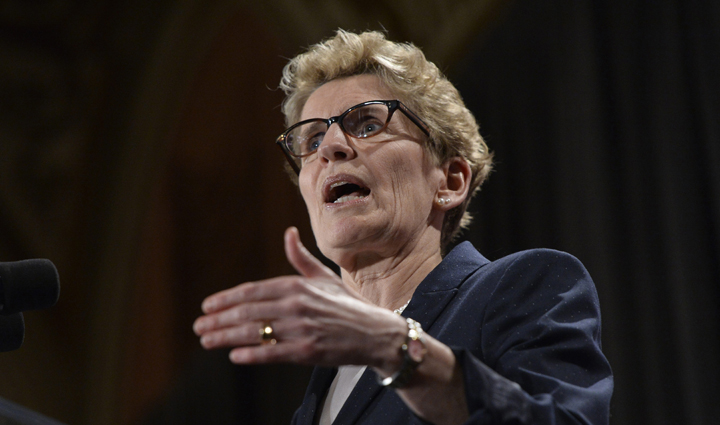TORONTO – Ontario’s premier and energy minister are not ruling out selling shares – even a majority stake – in Hydro One.

Premier Kathleen Wynne did not dispute a Globe and Mail report Tuesday that her government is planning to put up 10 to 15 per cent of the Crown corporation in an initial public offering, but said no final decision has yet been made.
A panel chaired by Ed Clark of TD Bank Group is looking at possible sales of Hydro One, Ontario Power Generation and the Liquor Control Board.
Energy Minister Bob Chiarelli said “several options and permutations and combinations” are on the table for Hydro One. He was asked repeatedly if that included selling a majority stake, but he would not rule it out.
“The province will have a significant ownership interest in it,” he said.
“We’re going to be very careful with respect to ensuring that ratepayers’ interests are protected and no determination has been made yet in terms of control or extent of control at this particular point in time.”
Wynne said whatever her government decides to do following the panel’s recommendations, it will control prices and make sure that regulatory regimes that protect Ontarians stay in place. What she will not do, she said, is divest an asset like Highway 407 “that was a huge value and then not make it work for the people of the province.”
“The reason for doing the asset review is to leverage dollars to invest every cent in transit, transportation infrastructure (and) infrastructure across the province,” Wynne said Tuesday.
Clark’s recommendations are expected to come this spring. In an interim report the panel concluded all three should remain in public hands, but said Hydro One should get out of the local distribution business and focus on its core transmission business.
Doing so would bring in up to $3 billion in private investment, and help facilitate consolidation in an “unnecessarily cluttered and fragmented” system of more than 70 local distributors, Clark has said.
The energy ministry said whatever decision is made on Hydro One, the government would “always retain an important ownership stake” in such a “vital and strategic” asset. Hydro rates would continue to be set by the Ontario Energy Board, the ministry said.
NDP energy critic Peter Tabuns was skeptical, saying he believes costs for customers would increase.
“If you privatize the system your hydro bill has to include profits for those private companies,” he said. “In the past we’ve run hydro on a non-profit basis. The cost that people paid was the cost of making electricity and distributing it.”
Progressive Conservative finance critic Vic Fedeli said he didn’t believe money generated from asset sales would go toward infrastructure. Rather, he believes, it will be used to help eliminate the province’s $12.5-billion deficit, which it has said it plans to do by 2017-18.
“What the Liberal government is doing is taking this one-time revenue and using it to balance the budget,” he said. “That’s the problem. They’re not using it for one-time expenses.”



Comments